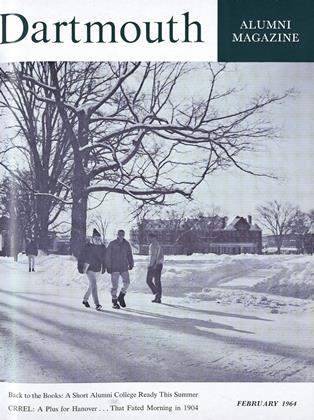By JamesM. Reid '24, John Ciardi, and LaurencePerrine. New York: Harcourt, Brace &World, Inc. 1963. 58 pp. $3.50; andSTEPS TO READING LITERATURE.By the same authors. Also a Harcourt,Brace & World publication, 1964.
James M. Reid '24, with the help of John Ciardi, Laurence Perrine, and others, has invented what he calls the programing of literature. Poetry: A Closer Look is followed by Steps to Reading Literature, which also deals with prose and plays. Programing is devised as a critical tool to improve reading skills in students from grades seven through twelve.
Edmund Fuller of Kent School says, "A program is a kind of exploded essay, with questions or statements with blanks or choices in them, inviting the active participation of the reader to complete the essay."
Mr. Reid faces the student with Seven Guides for Reading Poems. He says, "Programed instruction makes no claims to perfection. Good literature is always a various, supple, and multiple engagement between the reader and the author. The good reader learns to read in that multiple way. But the beginning must go step by step."
The danger of this method is in the brow-beating of students. Frost's poem on the Snowy Evening, for instance, requires 180 steps to penetrate its meaning. My Squirrel poem requires 96. Mr. Reid explained that once the student gets onto the method fewer questions are required.
The program lessens individualism. It tends to read out idiosyncratic approaches. It applies a scientific measuring technique to literature and, in the case of poetry, tries to get at its heart through logic and reason. The elusive qualities of illogic and unreason are harder to assess. The teacher tends to be displaced; the answers are given but the student should cover the answers and write in his answer to each question as an active participant. The authors modestly disclaim absolutism and say that this is only one way to learn to read poetry or prose. It is a mass media technique, not a test, which tends to make literature a kind of game in which the sleuthing is indicated by the gamesman and the student is supposed to follow the leader.
Adult readers are invited to survey the results of this free enterprise and form their own opinions as to its significance in relation to the cultural state of our society. Young students should take it as mindstretching but not mind-bending exercises before the big game.
Professor of English
 View Full Issue
View Full Issue
More From This Issue
-
 Feature
FeatureThe Fated Morning
February 1964 By HAROLD F. BRAMAN '21 -
 Feature
FeatureBACK TO THE BOOKS
February 1964 By R.J.B. -
 Feature
FeatureThe Cold, Cold World of CRREL
February 1964 By CLIFFORD L. JORDAN '45 -
 Feature
Feature$44,180,240 and How It Grew
February 1964 By FORD H. WHELDEN '25 -
 Article
ArticleTHE UNDERGRADUATE CHAIR
February 1964 By DAVE BOLDT '63 -
 Class Notes
Class Notes1936
February 1964 By BARRY C. SULLIVAN, E. JAMES STEPHENS JR.
RICHARD EBERHART '26
-
 Letters to the Editor
Letters to the EditorLetters to the Editor
September 1976 -
 Class Notes
Class Notes1926
May 1954 By HERBERT H. HARWOOD, ANDREW J. O'CONNOR, Richard Eberhart '26 -
 Books
BooksDARTMOUTH LYRICS.
NOVEMBER 1962 By RICHARD EBERHART '26 -
 Article
ArticleMeditation Two
MARCH 1963 By RICHARD EBERHART '26 -
 Books
BooksSELECTED POEMS.
MAY 1966 By RICHARD EBERHART '26 -
 Article
ArticleDartmouth Authors
April 1977 By Richard Eberhart '26
Books
-
 Books
BooksShelf Life
May/June 2001 -
 Books
BooksFORESIGHTS IN COLLECTIVE BARGAINING.
January 1947 By C. E. Dankert. -
 Books
BooksHELPING YOUTH IN CONFLICT.
JULY 1965 By GEORGE H. KALBFLEISCH -
 Books
BooksWINTER IN VERMONT
December 1941 By Harold G. Rugg '06 -
 Books
BooksDEAD SURE,
June 1949 By Herbert F. West '22 -
 Books
BooksTHE ROAD TO RENO.
June 1962 By W. R. WATERMAN

